Coronavirus: Australia to consider Europe-wide travel ban after Prime Minister Scott Morrison announces stimulus package
Prime Minister Scott Morrison has asked the government’s health chiefs to look at a Europe-wide travel ban amid the coronavirus crisis after revealing his $17.6bn economic stimulus package.

National
Don't miss out on the headlines from National. Followed categories will be added to My News.
- Coronavirus pandemic: How travel insurance will cover you
- Caltex, Maccas ban reusable cups as virus declared pandemic
Australia is actively considering an all of Europe travel ban as the coronavirus outbreak continues to spread.
Health Minister Greg Hunt said the National Security Committee had referred a potential Europe travel ban to health officials for consideration on Thursday afternoon, just hours after the US imposed similar restrictions.
If implemented it would mean all Australian citizens and permanent residents returning from Europe would be required to self-isolate for two weeks, while international visitors would be prevented from entering the country entirely.
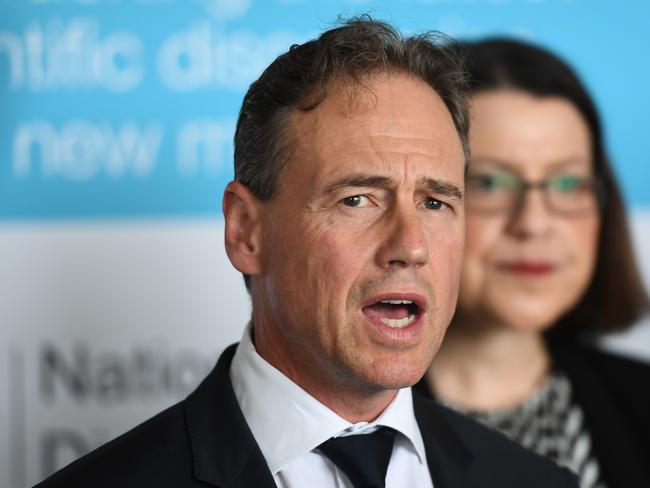
Multiple parliamentary trips scheduled over the coming two months have been postponed because of coronavirus.
Senate president Scott Ryan made the announcement on Thursday.
“Due to the evolving situation for international travel, several outgoing parliamentary delegations scheduled for March and April have been postponed,” Senator Ryan said.
“The situation will be reassessed as circumstances develop.”
It comes after the PM revealed details of the government’s $17.6bn economic stimulus package as Donald Trump announced a 30-day ban on all travel from Europe to the US.
America has closed its borders to Europe in an unprecedented shutdown aiming to curb the coronavirus crisis.
US President Donald Trump announced the restrictions in an address to the nation, in which he blamed China for the outbreak and said Europe’s slow imposition of travel restrictions had contributed to the pandemic.
The travel bans start at midnight on Friday, Mr Trump said, saying the US travel bans had helped slow the spread of COVID-19 in the US.
The United Kingdom and Ireland will be exempt from the ban, he said.
“The European Union failed to take the same precautions and restrict travel from China and other hotspots,” he said.
“As a result, a large number of new clusters in the United States were seeded by travellers from Europe.”
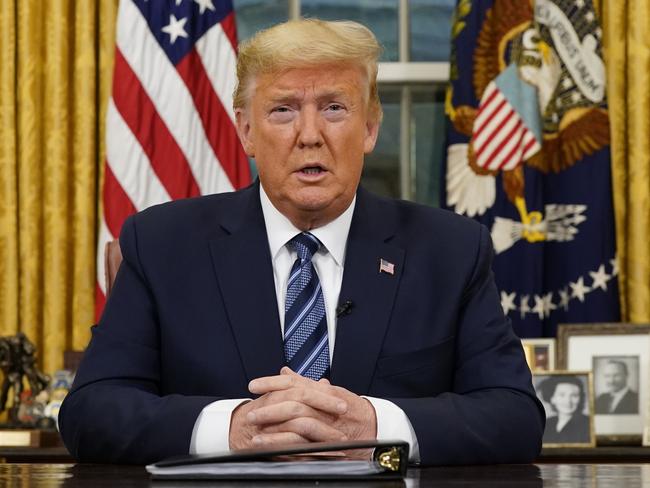
Mr Trump said he was taking “several strong but necessary actions to protect the health and wellbeing of all Americans”.
“The virus will not have a chance against us,” he said.
Mr Trump said Americans should avoid “non-essential travel to crowded areas”.
“If you are sick or not feeling well, stay home,” he said.
To ensure that Americans will not suffer financial hardship he said he is introducing “unprecedented measures” to help workers.
His stimulus package comes as a $17.6 billion economic stimulus package will include $750 cash payments to some Australian households.
Prime Minister Scott Morrison said pensioners would be one of the biggest beneficiaries out of the coronavirus measures.
Cash injections for small and medium-sized businesses are also part of the package.
“This plan is about keeping Australians in jobs ... this plan is about keeping business in business,” Mr Morrison said.
“It is businesses that keep people in jobs.”

Treasurer Josh Frydenberg announced $11 billion would be spent before the end of June.
“These are challenging times but the Australian people and the Australian economy are up to this challenge,” he said.
He outlined six key measures including $4.8 billion in one off cash payments to some welfare recipients.
The deeming rates have also been lowered by 0.5 per cent.
Mr Morrison said jobs were at the centre of the plan.
“Jobs are so important as part of our plan,” Mr Morrison said.
“It is a health crisis but it is a health crisis with very serious economic impacts.”
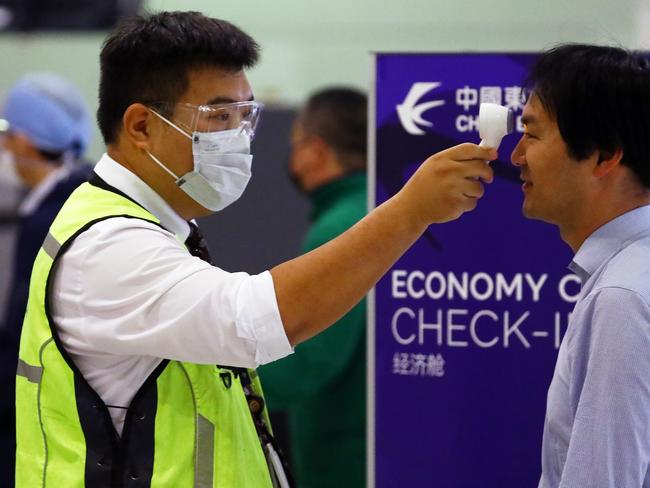
The $750 cash payments will be available for 6.5 million Australians including pensioners and people on Newstart.
“We believe these measures are the measures that can do the job,” Mr Morrison said.
“We got ahead of this early.”
The massive cash injection comes after the federal government announced $2.4 billion in coronavirus health spending.
In a win for hundreds of thousands of pensioners, the coronavirus stimulus package will include reductions in the deeming rate.
The deeming rate is the government’s assumption about retirees’ income from their financial assets.
Mr Morrison today said 0.5 percentage points would be shaved from the lower and upper deeming rates, reducing them to 0.5 per cent and 2.5 per cent respectively.
It follows a series of cuts to the Reserve Bank of Australia’s official cash rate.
The deeming rate is applied regardless of the actual return and can affect how much pension someone receives.
In response to falling market interest rates, the government last year cut the deeming rate on the first $51,800 of investment assets to one per cent, down from 1.75 per cent.
The assumed rate on assets of more than $51,800 was lowered from 3.25 per cent to three per cent.
That change affected 630,00 pensioners, with some as much as $1000 a year better off.
It had a $600 million impact on government finances over four years.

Groups such as National Seniors Australia reacted to the PM’s announcement by saying the upper deeming rate of 2.5 per cent was still too high.
National Seniors spokesman Ian Henschke said the deeming rate was unfair and way too high.
“No bank is offering anywhere near 2.5 per cent on their term deposits, in fact the Commonwealth Bank has a ‘special offer’ of 1.2 per cent on its term deposit, not even half of what the government deems is the return,” Mr Henschke said.
Mr Morrison will make a national TV address to all Australians tonight at 7pm AEDT.
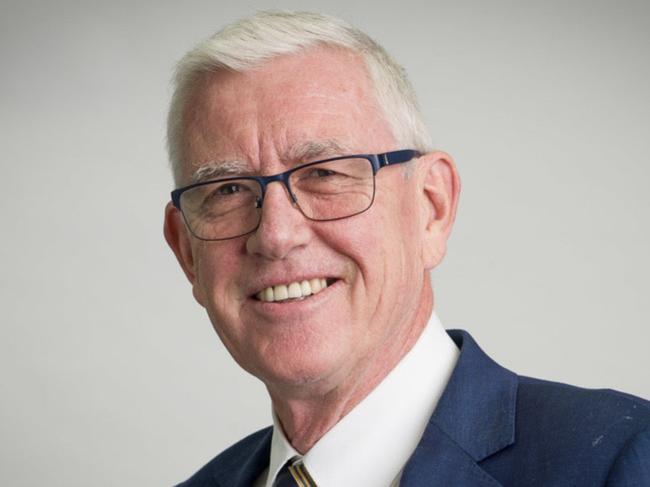
Mr Morrison told the ABC the cost was instead “one per cent” of Australia’s GDP — which is expected to be at least $18 billion.
The stimulus package is designed to help people stay in work and to help vulnerable business with any cash flow problems amid the pandemic, he said.
Mr Morrison also praised Australia’s response to the coronavirus pandemic, saying the nation had treated it as a problem beyond China, whereas the World Health Organisation did not.
“We’ve been acting to get ahead of it right from the outset,” he said.
It comes as federal Education Minister Dan Tehan warned school holidays could be extended as Australia considers drastic measures to contain the coronavirus.
He told the ABC medical advice will guide the decision and the government will not be rushed even though a last-minute call could leave working parents in a bind.
“It might be that school holidays need to be prolonged,” he said.
WOOLIES TO PAY CASUAL WORKERS WHO MISS SHIFTS
Woolworths says casual staff who are required to self-isolate due to the coronavirus will stiil be paid for the shifts they were rostered on to work.
In a win for the supermarket’s 55,000 casual workers, the retail giant sent a memo saying they will not be disadvantaged.

Workers who are required to care for others who have been isolated, such as children, will also be supported.
Full or part-time workers have been directed to take personal or carer’s leave, with Woolworths topping up leave for a maximum of two weeks.
AUSTRALIA ENCOURAGED TO CLOSE BORDERS
The Australian government should close the nation’s borders, cancel mass events and shut down schools and universities if it wants to dramatically reduce the death rate from the coronavirus.
That is the message from Grattan Institute chief executive officer John Daly, who said drastic “social distancing” measures in countries like Japan, Hong Kong and Singapore had been effective and slowed the virus.
Mr Daley told The Australian aggressive efforts in some countries to contain the spread of COVID-19 came at a significant economic cost — but appeared to have been largely successful.

“Australia has choices and there will be consequences,” Mr Daley said.
His assessment came as the number of confirmed cases in Australia increased to 137 from 100 24 hours early.
Globally, more than 120,000 people have been infected and more than 4300 killed.
Mr Daley told The Australian closing airports to foreign travellers would be an option to help stop the spread of the virus.
“The consequence of that would be you would probably see the number of cases in Australia drop to zero,” he said.
“The second option is that you keep doing what we are doing at the moment. At some point it is likely that we will start to see significantly more person-to-person transmission in Australia.
“If you have relatively non-stringent measures like Italy, you would start to see the number of cases go up pretty quickly and there would be a significant number of deaths of people over the age of 60.”
WHO DECLARES CORONAVIRUS GLOBAL PANDEMIC
The World Health Organisation (WHO) officially declared the coronavirus a global pandemic on Wednesday, more than two months after the start of the outbreak of the virus in China.
The COVID-19 disease has swept into at least 114 countries and killed more than 4000 people since first being reported in Wuhan in December.
“This is the first pandemic caused by coronavirus,” said WHO Director-General Tedros Adhanom Ghebreyesus.
Eight countries are now each reporting more than 1000 cases of COVID-19, caused by the virus that has infected more than 120,000 people worldwide.
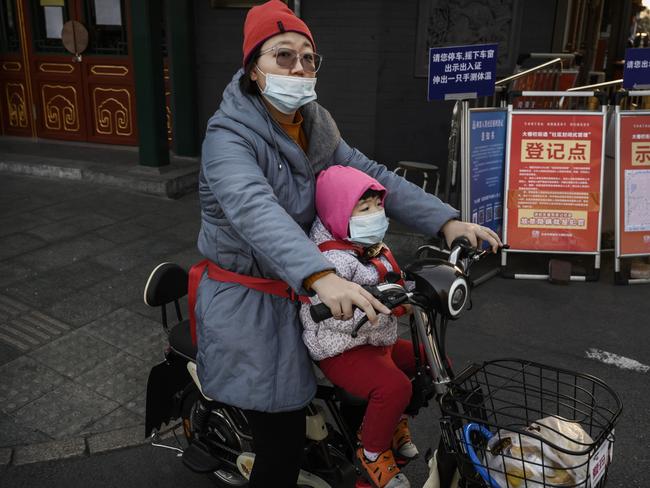
WHO made the announcement, expressing alarm both about mounting infections and inadequate government responses, but added that it’s not too late for countries to act.
By reversing course and using the charged word “pandemic” that it previously shied away from, the UN health agency sought to shock lethargic countries into pulling out all the stops.
“We have called every day for countries to take urgent and aggressive action. We have rung the alarm bell loud and clear,” said Mr Ghebreyesus.
“All countries can still change the course of this pandemic. If countries detect, test, treat, isolate, trace and mobilise their people in the response,” he said.
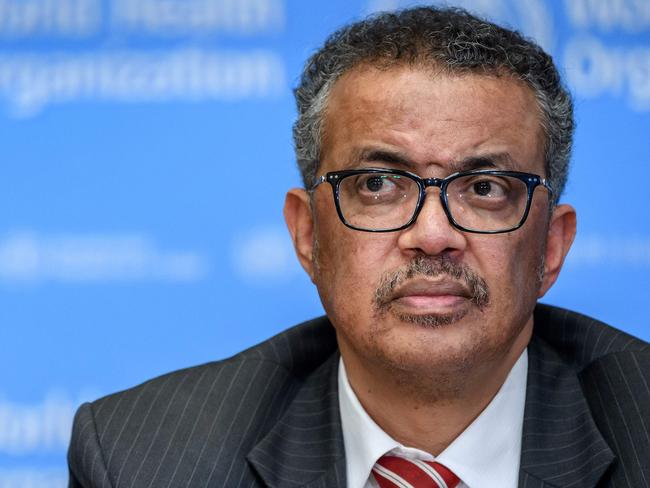
“We are deeply concerned by the alarming levels of spread and severity and by the alarming levels of inaction.”
The WHO said Iran and Italy are the new front lines of the battle against the virus that started in China.
“They’re suffering but I guarantee you other countries will be in that situation soon,” said Dr Mike Ryan, the WHO’s emergencies chief.
He added that the agency thought long and hard about labelling the crisis a pandemic – meaning a new virus causing sustained outbreaks in multiple regions of the world.
The risk of employing the term, Ryan said, is “if people use it as an excuse to give up.” But the likely benefits, are “potentially of galvanising the world to fight.”
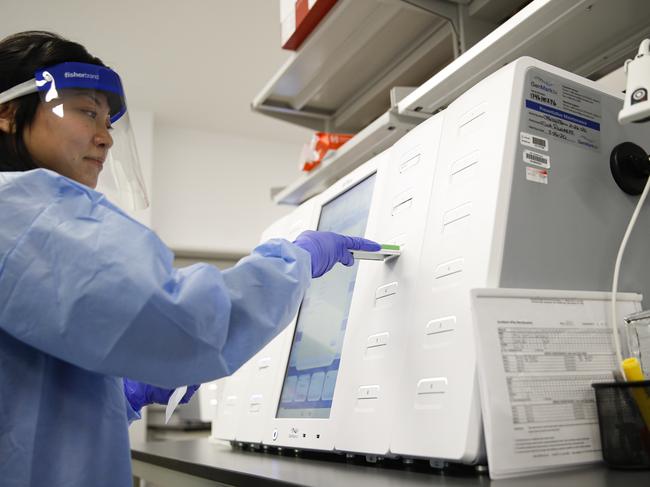
VIRUS NUMBERS JUMP IN US
Meanwhile, the number of coronavirus cases in the US surged above 1000 in 40 states as widespread community concerns grew over a lack of testing.
As the World Health Organisation declared the outbreak a pandemic, Americans were warned “it’s going to get worse”, by top immunologist, Anthony Fauci, in a House Committee on Oversight and Reform hearing in Washington.
“I can say we will see more cases, and things will get worse than they are right now,” said Dr Fauci, director of the National Institute of Allergy and Infectious Diseases.
“How much worse we’ll get will depend on our ability to do two things: to contain the influx of people who are infected coming from the outside, and the ability to contain and mitigate within our own country.”
Dr Fauci, who is the federal government’s top infectious diseases expert, also described the coronavirus as “ten times more lethal than the seasonal flu” and warned the US needed to take serious steps to stop “many millions” of infections.
“If we don’t do very serious mitigation now, what’s going to happen is we’re going to be weeks behind,” he said on Wednesday morning local time.
“It is going to be totally dependent on how we respond to it, so I can’t give you a number (of potential infections),” Dr Fauci said under questioning.
“If we are complacent and don’t do really aggressive containment and mitigation, the number could be way up and be involved in many, many millions. But if we sought to contain, we could mitigate it.”
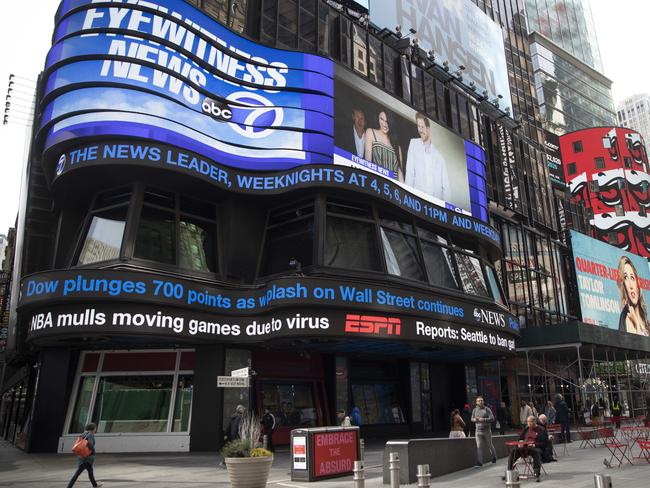
Dr Fauci warned Americans that the virus was going to impact the whole country.
“We would like the country to realise that as a nation, we can’t be doing the kinds of things we were doing a few months ago. It doesn’t matter if you’re in a state that has no cases or one case,” Dr Fauci said at the White House.
“If and when the infections will come, and they will come, sorry to say, sad to say.
“When you’re dealing with an infectious disease … we want to be where the infection is going to be, as well as where it is,” Dr Fauci said.
“Everybody should say, ‘All hands on deck.’”
Schools and colleges were closed in impacted communities across the US as the National Guard was deployed into a cluster hotspot north of New York City, where a one mile “containment zone” was established to limit community spread.
Schools, places of worship and public gatherings were shut down in New Rochelle, near a cluster centred on a synagogue which has infected dozens.
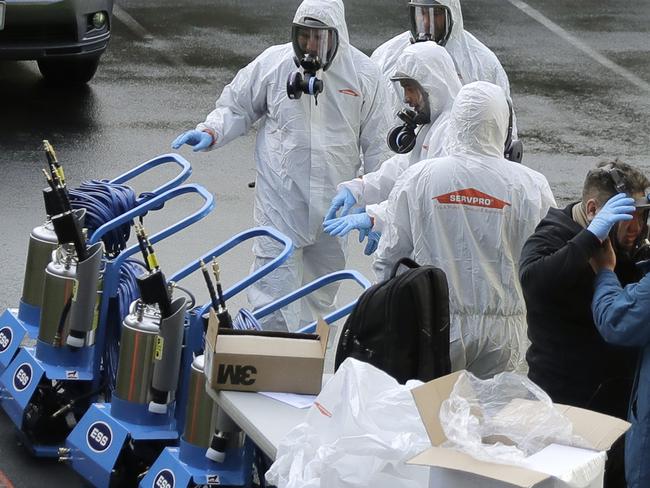
Colleges including Harvard, Princeton, Duke, Ohio State and the California state university system announced they would close classrooms and switch to online learning.
Google and some of the country’s biggest technology companies instructed their staff to work from home, and public gatherings were limited by state regulators across the country.
The Democratic presidential primary race was stymied as candidates cancelled rallies and the US federal government instructed people not to travel on cruises.
Some areas with bigger outbreaks also started drive-through testing, but Dr Robert Redfield, the Centers for Disease Control and Prevention Director, admitted there was currently capacity to test only 75,000 of America’s 330 million citizens.
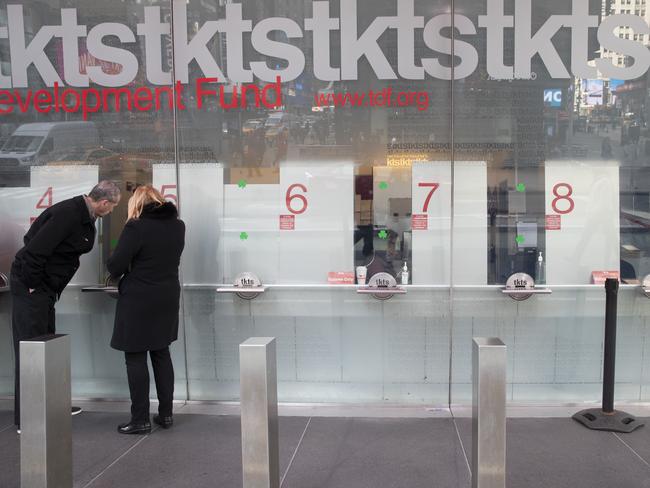
”As we experience the growing community spread in the United States, the burden of confronting this outbreak is shifting to states and local health professionals on the front lines,” Dr Redfield said.
The biggest US outbreaks are in Washington state (273 cases), New York (176 cases) and California (157 cases) and at least 31 Americans have died, most of them in clusters around nursing homes near Seattle.
Dr Brian Monahan, the attending physician of the US Congress, told staffers at a closed-door meeting as many as 70-150 million people in the country could contract the virus, Axios reported.
UK UNVEILS $60b BATTLE PLAN
It comes as the UK government announced a series of emergency measures worth £30 billion ($A60 billion) to protect Britain’s economy from the growing negative impact of the coronavirus outbreak.
Britain’s government and the Bank of England will also slash interest rates to a record-low 0.25 per cent.
The effects of COVID-19 “will have a significant impact on the UK economy — but it will be temporary”, finance minister Rishi Sunak told parliament in the first post-Brexit budget featuring the stimulus to help small businesses struck down by disruptions to supply chains and an absent workforce.
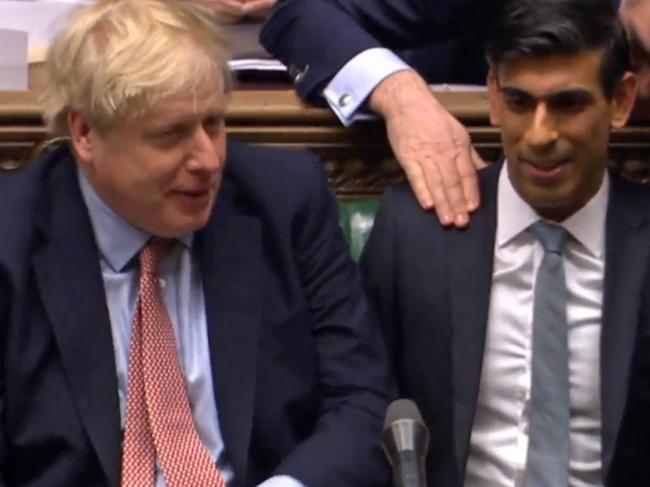
Mr Sunak rolled out his bumper three-point economic action plan on Wednesday (local time) to try and stop the spread of the deadly disease – with radical tax cuts, extra sick pay and help from the government, reports The Sun.
With markets in free fall and the UK at risk of being dragged into a global recession, the new Mr Sunak unveiled his bold package of measures to help Britain see off the deadly bug.
The groundbreaking budget includes plans to scrap business rates for businesses for a year, a fresh loan scheme to help small firms, and new help for people to claim benefits help from day one.
Britons will be able to get sick pay if they have to stay at home – even if they don’t have any symptoms of the virus.
Six people have died in Britain from the virus, with more than 450 confirmed cases, including Nadine Dorries, a minister in the health department.
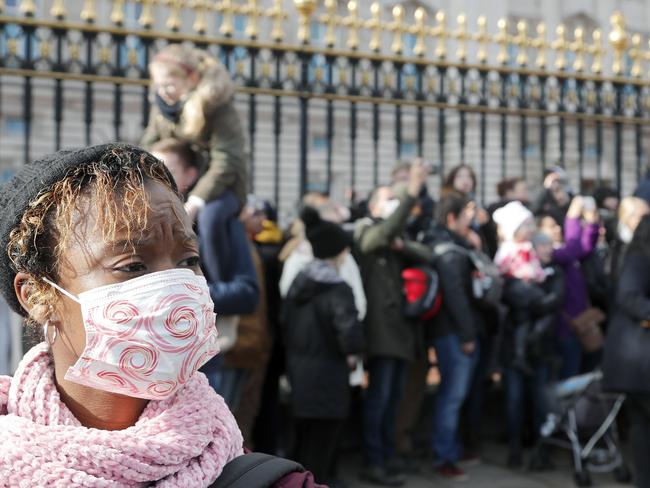
MERKEL’S FEARS FOR GERMANY
Meanwhile, German Chancellor Angela Merkel said up to 70 per cent of her country’s population could be infected by the deadly coronavirus – stressing the need to slow its spread.
“When the virus is out there, the population has no immunity and no therapy exists, then 60 to 70 per cent of the population will be infected,” she said during a press conference in Berlin on Wednesday (local time).
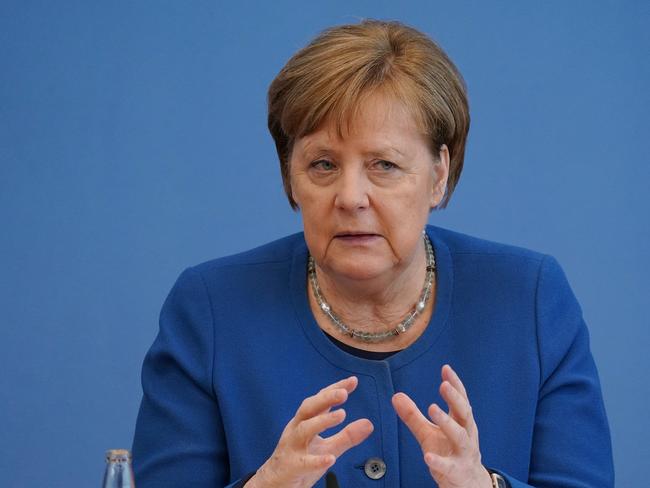
“The process has to be focused on not overburdening the health system by slowing the virus’s spread … It’s about winning time,” she added, according to Reuters.
Ms Merkel’s comments come after the German daily Bild assailed her handling of the outbreak, which it described as “the corona chaos.”
“No appearances, no speech, no leadership in the crisis,” the news outlet wrote.
As of Wednesday, Germany has confirmed two deaths and almost 1300 infections.
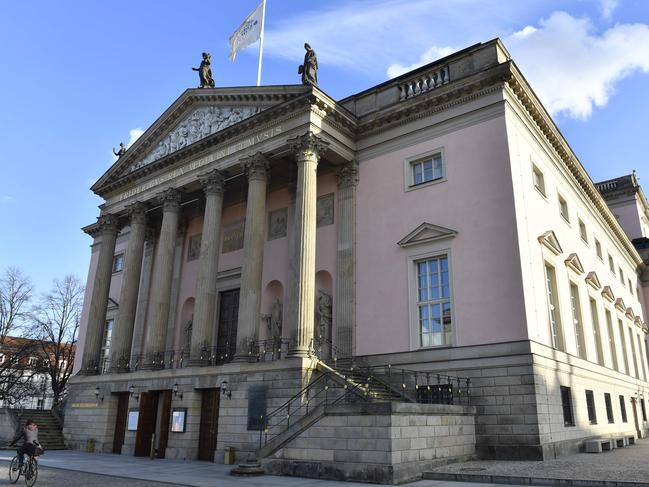
EUROPE ON TRACK FOR ITALY-STYLE LOCKDOWNS
It comes as Britain, Germany and France are on track for Italy-style lockdowns as cases across Europe soar, a leading scientist says.
Doctors in northern Italian hospitals are now making life or death decisions to prioritise treatment for younger victims because there are too many patients to treat.
And 20,000 people fleeing northern Italy to avoid the earlier lockdown, have been described as “biological bombs”.
“Everyone else will be Italy (in that country’s lockdown situation) in 9 to 14 days’ time,” University College London computer science researcher Mark Handley said.
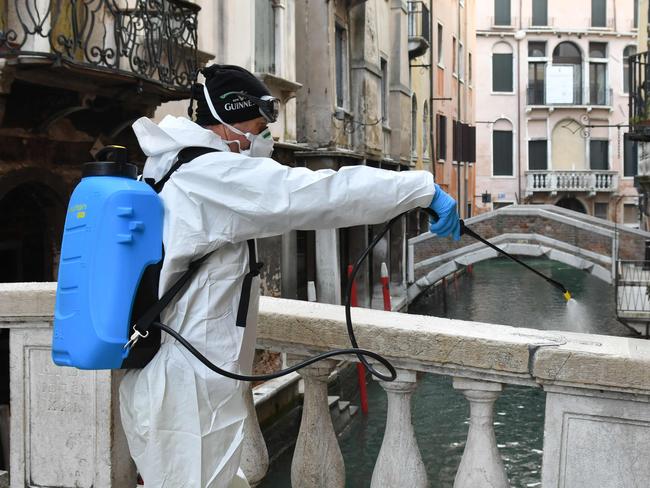
All shops are closed for 14 days in Italy, where pharmacies and food outlets will only be allowed to stay open.
Austria has also closed its border with Italy as it tries to stop the infection spreading there.
Austria’s Chancellor Sebastian Kurz announced early Wednesday Australian time the country would deny entry to anyone arriving from the locked-down nation of 60 million people.
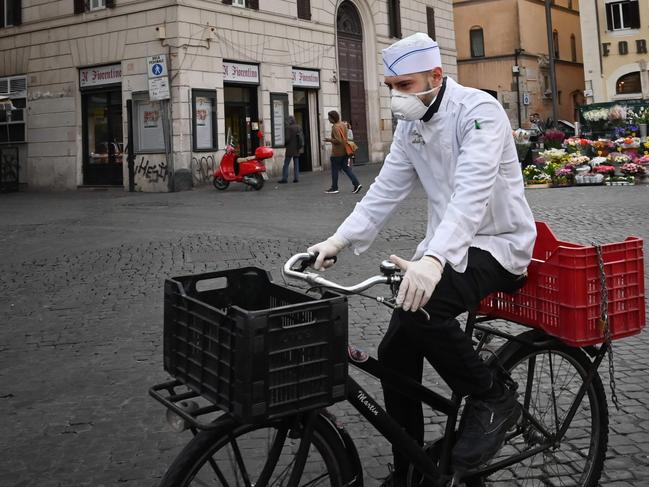
“The utmost priority is to prevent the spread and thus the importing of the illness into our society. There is therefore a ban on entry for people from Italy into Austria, with the exception of people who have a doctor’s note (certifying they are healthy),” Mr Kurz said.
Austria will still allow the passage of goods through its country and people to head straight to Germany, Mr Kurz confirmed.
The spread across Europe prompted the European Union’s 27 leaders to take part in a teleconference, Wednesday morning Australian time, to discuss how the region could best respond to the outbreak.
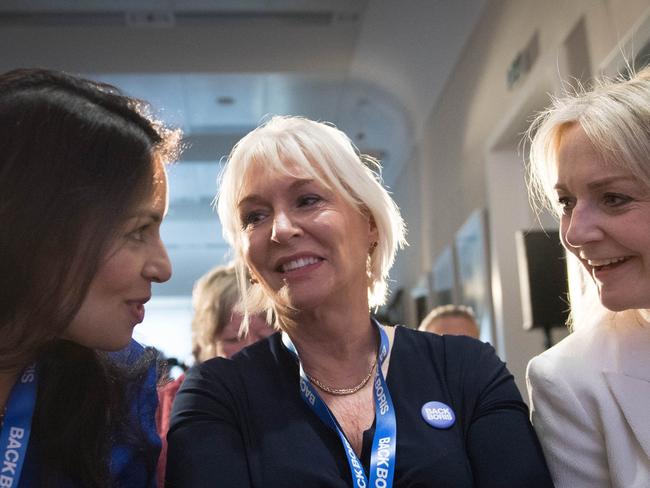
Australia’s Smart Traveller website also ramped up its warning for Italy on March 10, urging Aussies to reconsider their need to travel to the entire country and issuing a “do not travel” warning for the northern region.
The advice came as coronavirus entered the United Kingdom’s corridors of power, with
Health minister and Conservative MP Nadine Dorries returning a positive test. A parliamentary staffer who works with Ms Dorries has also been diagnosed.
Ms Dorries had been self-isolating at home.
Six people have died from the virus in the UK, which has more than 380 cases.
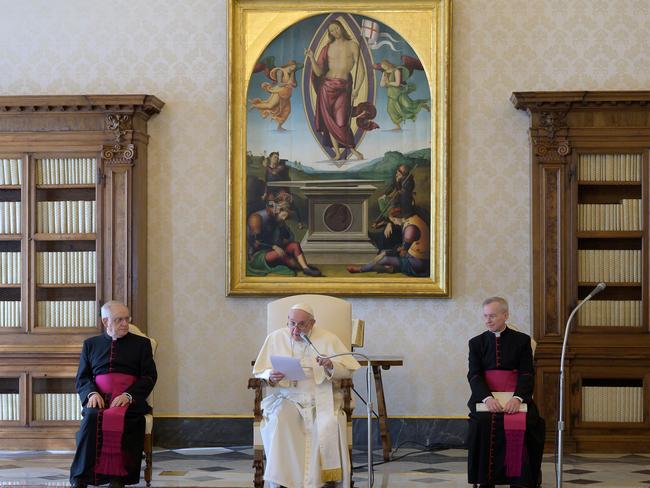
On Tuesday, Italy’s Prime Minister announced the entire country would be placed on lockdown until April in a bid to stem its coronavirus outbreak.
The announcement triggered chaos across Italy with more than 20,000 people in the north attempting to escape south.
The head of infectious diseases at Italy’s Higher Institute of Health Giovanni Rezza told local media the trains, carrying passengers from locked down areas, were like “biological bombs”.
The deadly virus has now killed 631 people in Italy, a 36 per cent jump from the day before.
The newest figures, published early Wednesday Australian time, also counted more than 10,000 confirmed cases in Italy.

A doctor at a hospital in Bergamo, near Milan, revealed the difficult choices that were now being made to ration medical care as the strain on the system became too much.
“If someone between 80 and 95 has serious breathing difficulties, you probably don’t proceed,” Dr Christian Salaroli, an anaesthetist, told The Times of London newspaper.
And nurse Elena Pagliarini has become a symbol of the hard working Italian medical staff after a picture of her asleep at a desk, still in a surgical mask and gown was published on Facebook.
“I hadn’t finished my shift yet when the photo was taken. It was just before 6am and I was absolutely shattered,” The Sun reported.
“I had another hour to go before I finished and I just collapsed.
“That night had been really tough but we are all working together.”

Elsewhere, Ireland cancelled all of its St Patrick Day celebrations on March 17. Sporting matches across most of the continent will be played without crowds, except for the Premier League in the UK where pre-match handshakes have been banned.
La Liga, Spain’s Football League, will be played behind closed doors until April after the Mediterranean nation reported a big jump in coronavirus cases. More than 1600 people have the virus. France adopted similar measures but is reluctant to close its borders with EU nations.
MORE NEWS
MH 17 witnesses ‘in fear of their lives’
Weinstein sentenced to 23 years in jail
Biden on track to win Democratic nomination
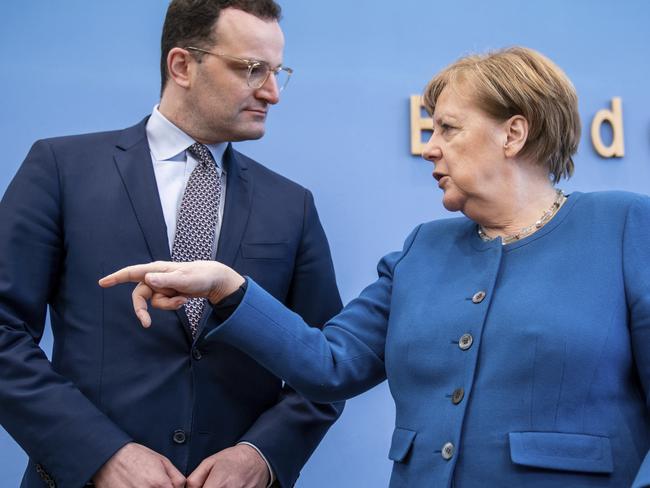
Germany, which has also reported more than 1000 coronavirus cases, has admitted it will likely fall into recession due to the illness.
“Unfortunately we’re expecting Germany to go into recession in the first half of the year,” the head of the Kiel Institute for World Economy, (IfW), Gabriel Felbermayr, told reporters.
Universities have also been shut for the next fortnight in a bid to stop the spread.
Indonesia recorded its first coronavirus death, a 53-year-old British woman.
The woman had already been in critical condition when she was admitted to a hospital, the health ministry said on Wednesday.
A spokesman for the British Foreign Office says it is supporting the family of the woman and are in contact with local authorities.
Indonesia has 26 other confirmed coronavirus patients.
PASSENGERS MAY FACE SPECIAL SCREENING
Visitors from other European nations notably Spain and France could soon face special screening measures when they arrive at Australian airports as the coronavirus sick report toll in their countries alarmingly rose.
Spain has begun shutting schools in several regions, cancelling festivals and banning indoor mass gatherings of more than 1000 people as the number of confirmed cases there increased 10-fold and authorities said they feared an “Italian scenario”.
Already some South American nations have imposed strict quarantine-isolation provisions on visitors from Spain, as well as Italy, and have flagged possible measures expanding to France and Germany.
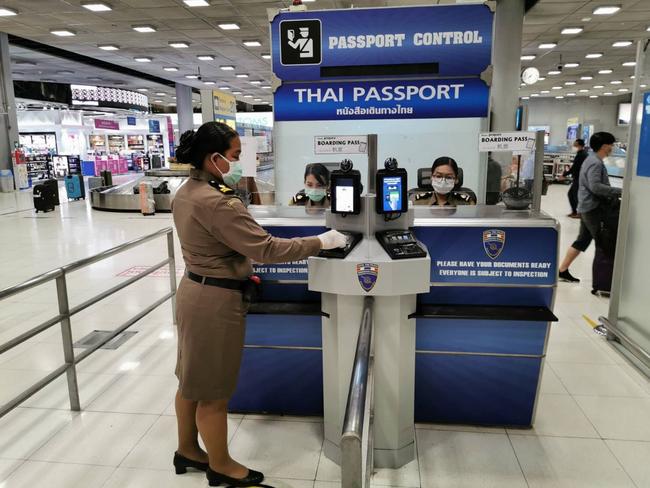
It is understood Australian authorities are not yet considering isolation periods for those who have been to Spain or France but are looking more to special screening measures including questionnaires at traveller embarkation and arrival points and airport handheld forehead temperature thermometers checks using forehead thermometers.
It were these provisions being used on Italian arrivals to Australian ports until last night when Prime Minister Scott Morrison imposed actual travel bans from Italy with that country’s infections commensurate with previously banned travel from Iran, China and South Korea.
“The Australian Government continues to keep border measures under close review in consultation with the Chief Medical Officer and the Australian Health Protection Principal Committee,” a Health spokesman told News Corp Australia of possible expansion of airport and traveller screening.

“There are processes in place at the border to assess ill travellers for risk of coronavirus and other diseases of concern. Travel restrictions are currently reviewed on a weekly basis.”
DFAT’s Smart Traveller alerts for France was at level 2 “exercise a high degree of caution” while Spain was at level 1 of exercise normal safety precautions.
While Spain and France have relatively low infection rates at about 1700 people each their death rates have spiked dramatically as a percentage of infections, at 35 and 33 respectively.
“We are working on avoiding the Italian scenario,” Health Minister Salvador Illa said as he announced closures and bans across Spain.
“With these measures we believe that we can avoid it and if we have to take additional measures, we will take them.”
Both countries have surpassed Japan into the top 6 of nations of greatest infection after China, Italy, Iran and South Korea.
Spain is the euro zone’s fourth largest economy.
VIRGIN AUSTRALIA’S MESSAGE TO PASSENGERS
Virgin Australia is taking steps to ensure passengers are protected amid the growing crisis.
In an email sent to members of the Velocity frequent flyer program, CEO Paul Scurrah said hand sanitiser and face masks would be available on board.
“To date, there has been no confirmed in-flight transmission of COVID-19 anywhere in the world,” he said.
“Despite this, it’s important you’re aware that we maintain the highest hygiene and cleaning practices on our aircraft and on the ground.
Mr Scurrah said Virgin Australia upheld the highest standards when it comes to cleaning aircraft.
“We’re ensuring our crew maintain high hygiene standards in the cabin, including practising proper hand sanitising procedures and cough etiquette,” he said.
“All our flights are equipped with hand sanitiser and face masks, and if any guest presents as unwell or with flu-like symptoms on one of our flights, they’ll be provided with a face mask and hand sanitiser, and where possible, moved away from other passengers.”
– with AP, staff writers
Originally published as Coronavirus: Australia to consider Europe-wide travel ban after Prime Minister Scott Morrison announces stimulus package


